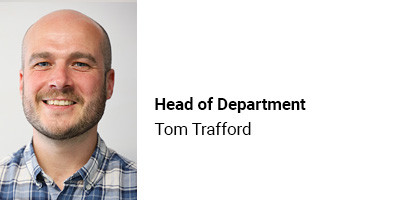Law (Applied) BTEC
Qualification: Law (Applied) Extended Certificate BTEC Level 3
Exam Board & Specification Code: Pearson; Specification
Course Entry Requirements: 4 in English Language GCSE or 4 in English Literature GCSE. It is not possible to study both Law A level and BTEC courses.
Please make sure that you have understood the overall entry requirements to study at BHASVIC. These are available here and outline the GCSE grades you need to take up one of the Study Programmes at the college.
Length and size of qualification: 2 year single course
Timetable hours: 4.5 hours per week
Assessment method: Coursework and exam
BHASVIC Department: Philosophy, Politics and Law
Read our guide to BTECs at BHASVIC
What will I study?
The BTEC Applied Law course is an enjoyable but challenging way of learning about how our English Legal System works. You will take a practical approach to learning about how laws are made and the structure of the court system. In the first year, you will learn the basics of criminal liability and the tort of negligence and will apply this knowledge to situations involving fictitious clients. In the second year you will build on this knowledge and study criminal law, including the law on homicide and police procedure, plus family law. You will develop key skills in legal research and communication, whilst also developing the independent learning skills needed for university study and future employment. This course will give you the equivalent of one A level over two years of study and is 40% coursework based.
Is this course right for me?
Do you know your rights? Are you interested in a career in Law, or studying Law or a Law-related course at university? The Applied Law BTEC is a unique qualification in the legal sector. It provides an excellent introduction to law and gives you an edge when progressing to higher education and employment.
Where next?
Studying Law BTEC gives students many transferable skills such as problem solving, critical analysis and negotiation skills, that will enable them to progress to university, apprenticeships and the world of work. Students could continue studying Law or a related course at university such as Criminology, International Relations, Public Services Management and Business. They also have the choice to use their work-based skills to seek employment in the legal or business world. For example, legal apprentices train on the job at law firms to eventually become solicitors, chartered legal executives or paralegals. Students may also choose to apply for related apprenticeship vacancies in broader sectors of the economy. Jobs directly related to Law could include Barrister’s Clerk, Chartered Legal Executive, Company Secretary, Licenced Conveyancer and Paralegal. Possible future careers where Law qualifications could be useful are Advice Worker, Chartered Accountant, Civil Service Administrator, Human Resources and Data Analyst. Useful websites to research careers and wider progression options could include The Lawyer Portal, Law Careers.net, The Law Society, All About Careers and The Apprenticeship Guide.
ApplyLast year, 82 BHASVIC students went onto study Law-related degrees at 36 different universities.
Law remains year on year one of our top ten subjects for University study. Popular universities include Sussex, Leeds, Exeter, Leeds, Liverpool, Manchester and Bristol UWE. 2 students went onto study Law at Oxford University.
Entry to most Universities can be through studying Law A level or Applied Law BTEC although students do not need to study Law at college to enter into Law at university.
Should I study Law at degree level?
A law degree combines the academic study of legal theory with applying law to real life scenarios. You’ll learn about criminal law, public law and company law as well as legal issues relating to topics such as property, the environment and human rights. Courses look at the content of these areas of the law, how they apply in real life cases & hypothetical situations, evaluate the law, and decide how we feel the law should alter to meet different social ways and needs.
Types of Law degree
Most Law degrees study Law as a single honours subject.
If you are thinking of studying Law it is important to consider whether the course accredits you with the LLB which translates to Bachelor of Laws, meaning that the actual degree classification is equivalent to that of a BA or a BSc.
Entry Requirements
A-levels (or equivalent) usually required
- No Specific Requirements
Useful to have
- An essay-based subject
- You may need to take the LNAT admissions test.
Top Universities for Law
Cambridge, Glasgow, Oxford, LSE, Aberdeen
Durham, Edinburgh, Leeds, Kent – all very high student satisfaction scores
York, Queens, Lancaster, Reading - all with top graduate prospects
Many of our students choose a combined degree - applications from our students have included:
- Law with American Law
- Law (International Legal Studies)
- Law with Human Rights including a Year Abroad
- Criminal Justice and Criminology
- Law and French (4 years)
Example entry requirements:
A-Level/BTEC equivalents (please check):
University of Law Law UCAS Points: 120
Edge Hill Law B,B,C-B,B,B
Manchester Law A*,A,A
Why not try a foundation degree or higher apprenticeship?
Reading Law (Foundation) E,E,E
Some examples of Law-related degrees that our BHASVIC students have gone onto study in the past few years are:
- Business Management with Law
- Common Law/English Literature
- Criminology with Law
- Criminal Law
- English Law and German Law
- Law (LLB)
- Law and Media & Communication
- Law with a Foundation Year
- Law with Hispanic Law (4 years)
- Law with International Relations
- Law with Politics and Human Rights
- LLB Law with Professional Placement
- Law with American Studies (with a study abroad year)
- Law and Criminal Justice LLB
- Law with English Law
- Law with International Legal Studies
- Law with Psychology
How BHASVIC helps: We have a wide range of information and resources to support students applying for university including subject area guides, personal statement and UCAS resources, super-curricular activity guides, open day and bursary information. We also cover university research, careers, art foundation and all other destinations in depth in tutorial and students can choose an appropriate pathway for them in the second year from UCAS, Employability & Enterprise, Visual Arts, Oxbridge and Medics. Our Spring Futures Fair brings in a huge number of university visitors with workshops and information stands and departments will bring speakers in wherever possible.
Studying law is a gateway to a career as a solicitor or barrister, but not the only path; there are many options beyond the legal profession:
- Advice worker
- Chartered accountant
- Civil Service administrator
- Data analyst
- Data scientist
- Forensic computer analyst
- Human resources officer
- Patent attorney
- Trading standards officer
Career Prospects
Law graduates tend to go into the legal industry, and they usually take similar routes. Jobs are competitive often very competitive but starting salaries are good and highfliers can earn serious money. Be aware though some careers, such as barristers, can take a while to get into. If you want to qualify to practice law, you need to take a professional qualification. If you want to go into work, then a lot of law graduates take trainee or paralegal roles and some do leave the law altogether, often for jobs in management, finance and the police force. A small proportion of law graduates also move into another field for further study. Psychology, business and social studies are all popular for these career changers, so if you do take a law degree and decide it’s not for you, there are options.
Civil Service Fast Stream
If you enjoy a challenge, want to make a difference and are eager to take on responsibility, consider joining the Civil Service Fast Stream. The Civil Service Fast Stream is an accelerated leadership development programme that provides talented graduates from a range of backgrounds with the experience, skills and knowledge needed to become senior leaders within the Civil Service. You'll gain a variety of experience through different placements or postings in government departments and agencies. may work in roles involving direct contact with the public.
Examples of apprenticeships and opportunities include:
- Barrister The Army
- Legal Officer East Sussex County Council
- Family Law Solicitor
How BHASVIC helps: We have an excellent Careers Hub and careers advisors who are available for appointments through student services. Local jobs are advertised and they will advise on skills and specialist areas such as degree apprenticeships. Students can choose an appropriate pathway for them in the second year from UCAS, Employability & Enterprise, Visual Arts, Oxbridge and Medics. Our Spring Futures Fair brings in a huge number of careers & apprenticeship visitors with workshops and information stands and departments will bring speakers in around the subject area.
You will gain many transferable skills studying Law that will be valued in the workplace including:
Research, communication and analytical skills, critical thinking, exploring a variety of perspectives, writing and presentation skills, teamwork, leadership, time management
Local Skills
The Local Skills agenda considers job prospects and employment in our local area of Sussex. Many of our students will contribute to the National Skills agenda and go onto find a career in a wide range of sectors. For students in Sussex our local skills are identified as the following sectors:
- Construction
- Creative & Cultural
- Digital (includes IT and Technology)
- Engineering & Manufacturing
- Healthcare (includes Bio Life Sciences and Pharmaceutical)
- Visitor & Hospitality
- Land-based (includes Agriculture and Viticulture)
- Green Skills
Degree choices that match the Local Skills agenda our BHASVIC students went onto study for Law include:
- Law LLB
- Law with a Language
- Law with Business
- Law with International Relations
- Law with Philosophy
Career choices that match the Local Skills agenda our BHASVIC students went onto study for Law include:
- Family Solicitor
- Prison Officer
- Police
- Civilian Investigator
- Court Officer
How BHASVIC helps: Skills Week in A1 helps students build skills in the workplace and a focus on developing skills through tutorial in A1 and A2 supports students in writing outstanding Personal Statements and CVs. We know our students have already gained a wide variety of skills at home and with extra-curricular activities and will increasingly take up jobs. Our focus is on supporting them to evidence skills already gained, identify gaps and ensure that they transfer that to CVs and applications. This is in partnership with every curriculum area.

